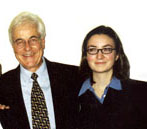
John Fiset and
Marie-Andrée Boucher at the award presentation
|
Marie-Andrée Boucher
has been awarded the Gilles-Joncas Bursary for being the best university
co-op student in Quebec.
Boucher is in her last academic term in Actuarial Mathematics, and has
had a brilliant academic career. An early winner of scholarships going
back to her high-school days, she won several scholarships at Concordia,
and has put in four work terms while earning a perfect 4.3 grade-point
average.
She is halfway through writing the nine gruelling exams set by the professional
actuarial society, in which she has also excelled.
Her first two work terms were with Ernst and Young in Toronto, where she
perfected her English, and she subsequently worked at Standard Life and
Axa Insurance here in Montreal. She is finishing her studies this term,
and begins her career with Ernst and Young in Montreal in January.
The $500 award was presented at a professional development session held
on October 26 in Trois-Rivières and is given by the Association
canadienne de l’enseignement coopératif (ACDEQ-Québec).
It is named for Gilles Joncas, who was the pioneer of co-op programs at
the Université de Sherbrooke, and helped Concordia’s program
get off the ground.
Boucher’s name was proposed for the competition by the Actuarial
Mathematics co-op coordinator at the time, Brigitte St-Laurent-Taddeo,
who is now at McGill, and she was proudly introduced by John Fiset, retired
but still active as vice-principal emeritus of Concordia’s Co-op
Institute.
Co-op Institute offers elite
program
Concordia’s Institute
for Co-operative Education offers work-study programs in the following
departments: Chemistry/Biochemistry, Economics, Études françaises
(Translation), Mathematics and Statistics, Physics, Accounting, Finance,
Management Information Systems, Marketing, Human Resource Management,
Building/Civil/Environmental Engineering, Computer Science, Electrical
and Computer Engineering, Mechanical and Industrial Engineering, and Software
Engineering.
There are about 700 students in co-op programs at the moment, but vice-principal
Craig Brown believes that by the end of 2001 that number will have grown
to 1,000, or as Brown puts it, “between 10 and 12 per cent of our
full-time equivalent enrolment.” In addition, co-op is going online
in the next year or so, with listings of placements and applications that
can be done electronically.
“We’re very flexible, but we do not have an open-door policy,”
Brown said firmly. This is a selective program, and only the best and
most motivated students need apply.
Students may work in the summer, the winter, or the fall term, depending
on their program. Right now, the Co-op is abuzz with placement interviews
for the work term that begins in January.
These interviews work both ways. The potential employers rate the students
and vice versa. The students may have to fit seven or eight interviews
into their busy class schedules over this period.
The result is what Brown calls “the matrix,” and the all-important
fit between applicant and employer is managed by a co-ordinator.
Members and graduates of the Co-op Institute celebrated their 20th anniversary
at Homecoming this fall. The reception drew about 150 people, who had
fun reminiscing, and describing how their careers had developed.
Co-op Institute provides
a tool for safety
Every year, Environmental
Health and Safety is approached by Concordia’s Co-op Institute to
see if they’d like an intern. The unit has played host to students
from Management Information Systems, Communication Studies and other disciplines.
This year, they were offered a Marketing Co-op student — just when
they needed one. The Central Advisory Health and Safety Committee had
recommended publishing a brochure to make employees aware of the services
available to them. “It fit very well,” said Assistant Administrator
Donna Fasciano, who coordinates training for EHS.
For Marc Purdon, it was his first summer work term, and came after a year
of Marketing studies. He said, “I learned a lot — how to manage
a project, how to work in an office environment, and how to take responsibility
and initiative.”
The brochure is called Take Care, and it will be launched next week. It
describes three university departments, Facilities Management, Environmental
Health and Safety, and Security, and gives typical situations in which
each can be of assistance. Employees are invited to obtain a checklist
to evaluate their own work environment.
Now Marc is thinking about his next co-op experience, to start in January.
“I’ve applied for nine or 10 jobs,” he said, “and
so far, I’ve had two interviews.”
|
|
|



